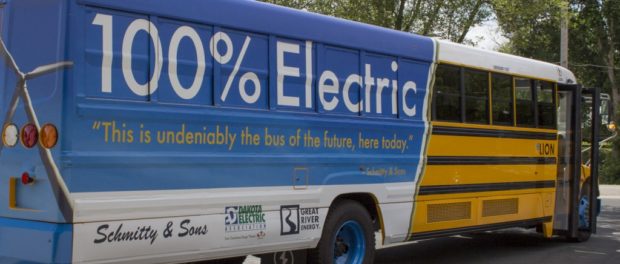ST. KITTS AND NEVIS TO BENEFIT FROM ELECTRIC SCHOOL BUS
Get our headlines on WHATSAPP: 1) Save +1 (869) 665-9125 to your contact list. 2) Send a WhatsApp message to that number so we can add you 3) Send your news, photos/videos to times.caribbean@gmail.com

Basseterre, St. Kitts, November 29, 2017 (SKNIS): A new initiative is set to be implemented, which will see the energy and transportation sectors in St. Kitts and Nevis transformed, as the result of a pilot project using electric school buses.
The project is a partnership between the Government of St. Kitts and Nevis and the Caribbean Community Climate Change Centre (CCCCC) in Belize with financial support from the Government of Italy. This pilot project will support the procurement and installation of two solar-powered battery charging stations and at least three electric buses to replace aging and inoperable diesel and gasoline buses in the current fleet. Local capacity will be built through training and exposure to install and operate the charging stations and the buses during the pilot phase.
Cheryl Jeffers, Conservation Officer in the Department of Environment, said that the successful implementation of the project will bring many benefits to St. Kitts and Nevis as the aim is to support and contribute to the federation’s transition to a low carbon economy by facilitating a shift from the use of fossil fuels to the use of renewable energy in public transportation.
She said that a successful pilot demonstration will serve as the basis to develop appropriate policies and legal frameworks that support the scaling up and transformation to a significant electric fleet of motor vehicles for public transport over the medium to long term. Resulting benefits will include financial contribution to the economy of the federation and the reduction of its Green House Gas emissions from the transport sector. The project is also expected to generate environmental and social benefits.
“One of the most important benefits that we have identified is that it will allow us to meet our targets,” she said, adding that in 2015, St. Kitts and Nevis submitted its National Determined Contributions (NDC) to the United Nations Framework on Climate Change. “In the document, we committed to reduce our Greenhouse Gas Emissions by 22 and 35 percent in 2025 and 2030 respectively. Special attention was identified within the energy and transport sector, as those two sectors were recognized as the highest contributors to our Greenhouse Gas Emissions. And as such, we thought that the implementation of this project will allow us to begin the process of achieving our targets.”
Ms. Jeffers said that because this is a new project a number of studies, must be done before the actual procurement of the buses. Such studies include a technical feasibility study; an environmental, social and impact assessment; and an economic feasibility study. She further noted that these will be done as a way to engage the public and private sectors so as to get a feel of their mindset, recognizing it’s a new initiative.
“Upon the successful completion of these studies the reports will indicate to us the most practical and feasible type of buses that will be used in St. Kitts and Nevis. Tentatively, we are proposing that the study should not take more than six months and it is our hope that for the 2018 school year, it is possible that we can actually get the buses up and running,” said the conservation officer.
The conservation officer stated that the intent is to have government take the lead – using the schools buses – and with the successful implementation, it is hoped that the remaining government fleet, followed by the private sector, will be entirely transformed in a few years.
Leave a comment
You must be logged in to post a comment.